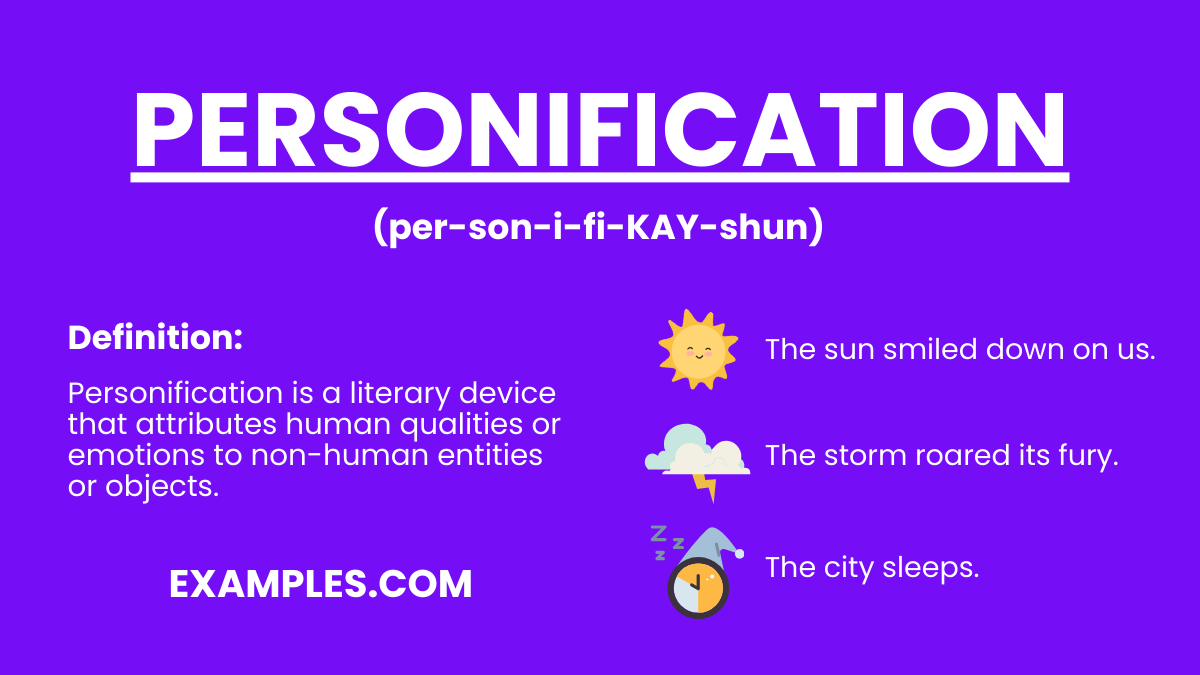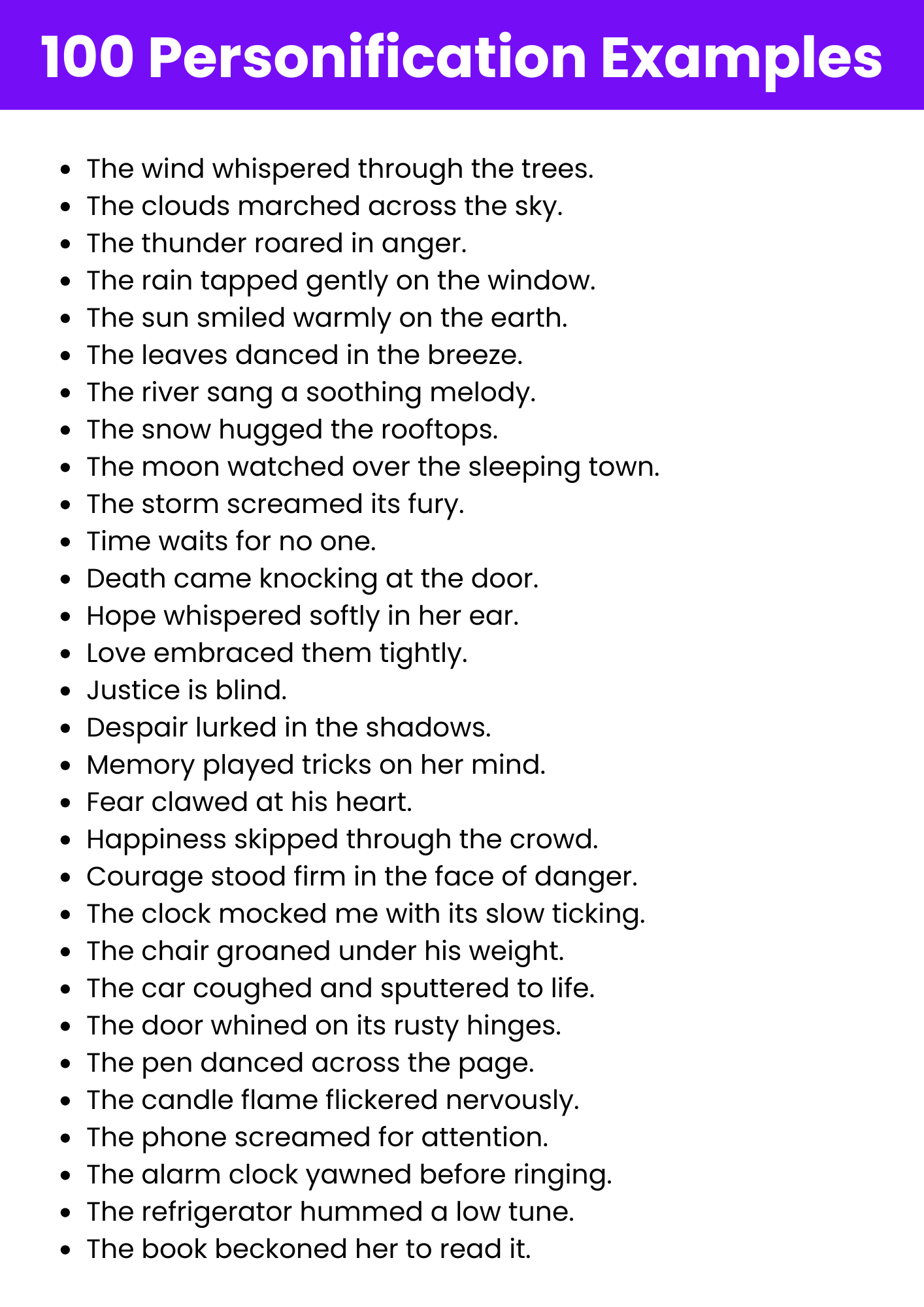Personification
What is Personification? – Definition
Personification is a literary device where human qualities are attributed to non-human entities or objects. It brings life and emotion to inanimate things, making descriptions more vivid and engaging.

Generated Personification Examples

Download Personification Examples
Enhance your understanding with our comprehensive PDF guide.
Download PDFExamples of Personification
- The wind whispered through the trees.
- The moon danced with the stars.
- The cold greeted me as I stepped outside.
- The city never sleeps.
- The flowers nodded their heads in the breeze.
- Time tiptoed away quietly.
- The sun smiled down on the meadow.
- Her laughter filled the room with joy.
- The garden welcomed us with open arms.
- The river sang a soothing melody.
- The trees whispered secrets to the wind.
- The flames danced eagerly.
- The morning sun stretched its golden arms.
- The fire eagerly devoured the logs.
- The clouds hugged the mountains tightly.
- The camera captured the dance of the leaves.
- The clock mocked me by ticking slowly.
- The mirror betrayed his true feelings.
- The road beckoned us to adventure.
- The sunset painted the sky with passion.
- His mind is a bustling city.
- The city breathed life into its inhabitants.
- The classroom buzzed with excitement.
- Her smile was the sunniest part of my day.
- Life danced gracefully around us.
- Life sailed smoothly on calm seas.
- She was an anchor during turbulent times.
- His eyes were gateways to his soul.
- She stood tall like a steadfast mountain.
- His temper was a raging storm.
Types of Personification
Emotional Personification
Gives human emotions to objects, animals, or abstract concepts.
- The sun smiled down on us.
- The wind howled in anger.
- The clock seemed impatient as the hours dragged on.
- The flowers danced with joy in the breeze.
- The moon watched over the world with calm serenity.
Behavioral Personification
Assigns human actions or behaviors to non-human things.
- The leaves whispered secrets to the wind.
- The waves chased each other to the shore.
- The chair groaned under his weight.
- The fire devoured the logs hungrily.
- The shadows crept across the room.
Physical Personification
Attributes human physical traits or characteristics to non-human entities.
- The mountain stood tall and proud.
- The tree stretched its arms to the sky.
- The clouds wore a golden crown at sunset.
- The book lay open, waiting for someone to read it.
- The path curved, inviting travelers forward.
Abstract Personification
Gives human qualities to abstract concepts or ideas.
- Justice is blind.
- Time waits for no one.
- Love wrapped its arms around them.
- Death knocked softly at the door.
- Hope whispered in the darkest moments.
Animal Personification
Applies human traits or abilities to animals.
- The fox smirked slyly before darting away.
- The cat greeted me with a knowing look.
- The dog grinned with happiness.
- The birds sang a cheerful melody to welcome the morning.
- The horse trotted proudly across the field.
How to Identify/Find Personification?
To identify personifications, look for phrases that attribute human qualities or actions to non-human entities or objects. Personifications often make descriptions more vivid and relatable by drawing parallels between human and non-human characteristics.
- Look for direct or indirect attribution of human traits to non-human elements.
- Identify words or actions that are typically associated with humans.
- Check if the description enhances the understanding or imagery of the subject.
- Notice if the comparison adds emotional or descriptive depth.
- Look for personifications that are integral to the theme or message.
How to Use Personification?
Use personification to bring your writing to life by attributing human qualities to non-human elements. This enhances imagery, evokes emotions, and makes descriptions more engaging. Ensure your personifications are clear and relevant to the subject to avoid confusion or mixed messages.
- Choose comparisons that resonate with your audience and fit the context.
- Use vivid and specific imagery to make your personifications stand out.
- Integrate personifications seamlessly into your narrative or argument.
- Ensure the personification enhances the reader’s understanding or emotional response.
- Avoid overusing personifications to maintain their effectiveness.
Other Personification Examples
Personifications in Daily Life
Daily life is filled with personifications that help us convey our thoughts, feelings, and experiences more vividly.
- The morning sun woke the sleepy town.
- Her voice is music to my ears.
- His words cut deeper than a knife.
- Laughter is the best medicine.
- The world is your oyster.
Personification Examples for Kids
Introduce children to the enchanting world of kid-friendly personifications with relatable comparisons like “smile is sunshine” or “friendship is a warm blanket.”
- The clouds are cotton candy.
- Her smile is sunshine.
- The playground is a jungle.
- His room is a tornado.
- The stars are diamonds in the sky.
Personification Examples for Students
Empower students with personifications that make learning engaging. Discover how “studying fuels the brain’s engine” and “creativity is a toolbox of colorful ideas.”
- Knowledge is a light in the dark.
- The classroom is a hive of activity.
- Books are keys to wisdom’s treasure.
- Homework is a mountain to climb.
- The mind is a powerful engine.
Personification Examples in Literature
Personification in literature brings non-human elements to life, enhancing storytelling and making descriptions more vivid.
- “The wind whispered secrets through the trees.” – “The Scarlet Letter” by Nathaniel Hawthorne
- “The night swallowed the city in darkness.” – “1984” by George Orwell
- “The stars danced playfully in the sky.” – “Romeo and Juliet” by William Shakespeare.
- “Death wandered into the room, waiting for its moment.” – “The Book Thief” by Markus Zusak
- “The ocean heaved a sigh of relief.” – “Moby Dick” by Herman Melville.
Personification Examples in Poetry
Creative personifications that bring inanimate objects or nature to life by giving them human-like qualities.
- Because I could not stop for Death, he kindly stopped for me.
- The sun rose and stretched its golden arms.
- The autumn leaves spoke of their impending fall.
- The river sang a song of peace and freedom.
- The storm screamed its fury across the land.
Personification Examples in Songs
Personification in songs makes lyrics more expressive and emotionally resonant.
- “Hello darkness, my old friend.” – “The Sound of Silence” by Simon & Garfunkel
- “The wind is howling like this swirling storm inside.” – “Let It Go” from Frozen
- “The moon danced over the bay.” – “To the Moon and Back” by Savage Garden
- “Time grabs you by the wrist, directs you where to go.” – “Good Riddance (Time of Your Life)” by Green Day
- “The thunder calls you home.” – “Landslide” by Fleetwood Mac
Explore Other Literary Devices
Elevate Your AP English Preparation
Unlock your potential with our comprehensive AP English exam preparation tools designed to help you excel.
- Extensive Question Bank: Access 900+ exam-like questions for both AP English Language and Literature.
- Expertly Crafted: Questions mirror the structure and difficulty of actual AP exams, ensuring relevant practice.
- Detailed Explanations: Understand your mistakes with clear, concise breakdowns of correct and incorrect answers.
- Personalized Learning: Tailor your study sessions with topic-specific tests and adaptive learning tools.
- Comprehensive Coverage: Master all aspects of the AP English curriculum with extensive guides and resources.
Frequently Asked Questions
-
What is personification?
Personification is a figure of speech that gives human characteristics to non-human entities or objects, enhancing descriptions and making them more vivid and relatable. -
How does personification differ from a metaphor?
While both personification and metaphor involve comparisons, personification specifically attributes human qualities to non-human entities, whereas metaphors compare two unrelated things by stating one is the other. -
Why is personification important in writing?
Personification enriches writing by adding depth and creativity, making descriptions more engaging and helping readers visualize concepts more vividly and emotionally. -
Can personifications be extended?
Yes, extended personifications continue to attribute human qualities to non-human elements throughout a passage or an entire work, providing a more comprehensive and elaborate connection. -
How can I effectively create my own personifications?
To create effective personifications, identify the essence of what you’re describing, find human qualities that align with it, and express the comparison in a clear, imaginative way.

